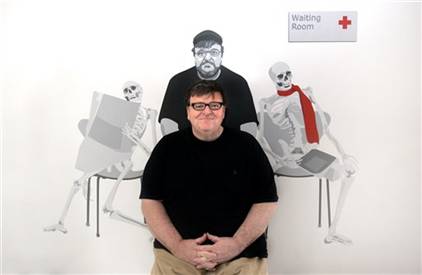
As Devin mentioned yesterday in Eli Roth Is The One Getting Tortured Now, this weekend saw widespread piracy of Michael Moore’s Sicko. Not only did the film hit Bit Torrent trackers (that happened last week, actually) — one or more people broke the film up into chunks and placed it on YouTube, and a copy briefly appeared on Google Video as well.
Lionsgate and Weinstein Company bulldogs have already seen to the removal of the YouTube and Google Video versions, which were sourced from a longer cut (124 minutes) than the version that appeared at Cannes. Reuters quotes Weinstein lawyer Peter Hurwitz: "Every DVD screener that comes from the Weinstein Co. is watermarked
and traceable. We
are actively investigating who illegally uploaded ‘Sicko’ to the
Internet, and we will take appropriate action against that person(s)."
The same article on the piracy notes that Fahrenheit 9/11 was widely bootlegged prior to release, with apparently no effect on the film’s massive global box office. But that was before YouTube and at a time when Bit Torrent wasn’t as widely used — the effects of piracy now could theoretically be more damaging.
Not that I’m challenging Devin’s assumption that the pirate audiences for Hostel and Sicko are probably very different, but it’s impossible not to wonder if piracy will dent Sicko at all, or if any financial failure will be blamed upon it. As we’ve already seen with Hostel, piracy is a great go-to bullet point when it’s time to pin the blame for failure. And since summer isn’t a much better atmosphere for sober documentaries than it is for horror, it’s possible Michael Moore might need a scapegoat.
This sort of thing, however, is simply a part of the new reality of film distribution. The music business learned it years ago and studios are just facing the same harsh truth.
But in light of the weekend’s piracy and Eli Roth’s comments blaming the floppage of Hostel Part II on similar circumstances, the truly interesting comments came straight from Moore himself. In a short piece published by Brandweek, Moore (speaking at the film’s NYC premiere) expressed a distaste for copyright laws, further noting that "I think the music industry’s response to Napster was
misguided … and for me, it’s about getting people to see the movie and
that’s what I want, so they will talk about it."
And while elaborating that he makes films to be seen communally on a massive screen, he mentioned "I would never want to prosecute anybody who would download [Sicko]."
That’s hardly a revolutionary stance for an artist; it’s almost the exact line we’ve heard from indie musicians and even major label bands, especially back in the immediate wake of the Metallica/Napster flap. But it’s not what we’re used to hearing from a najor filmmaker, even one noted for a socialist bent. Let’s see if he still feels the same way a couple Mondays from now.